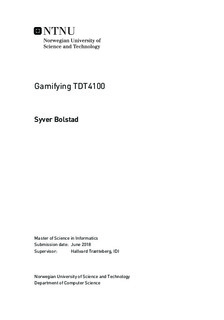Gamifying TDT4100
Master thesis
Permanent lenke
http://hdl.handle.net/11250/2579067Utgivelsesdato
2018Metadata
Vis full innførselSamlinger
Sammendrag
There have been major advancements in information technology lately, and therefore an ever growing need for good programmers. This leads to more programming students, and an increasing pressure on the educators. The course TDT4100 Object-oriented programming at Norwegian University of Science and Technology(NTNU) makes use of teaching assistants who read the students' code and provide feedback on code quality, which is time consuming for both students and teaching assistants. Advances in information technology have also led to an increased interest in computer games and introduction of the term gamification, which describes the use of elements from games in non-game contexts. This study addresses the development of a prototype of a learning system that through gamification attempts to supplement the coursework of Object-oriented programming, and explores the benefits introduced by the prototype. The learning system has an additional focus on the wide range of programming skills relevant to the course.
The first part of the study provides a detailed introduction to the term gamification, where both positive and negative sides are explored. In addition, a small introduction to code quality is provided, and how code quality information can be retrieved from the code automatically. These findings are then adapted to Object-oriented programming, and are used together with the feedback from iterative user test as the basis for the development of the prototype.
The next part of the study handles simulating the usage of the system using previously delivered code. The results of the simulation show that the prototype is not adequately customized and that it has many possible improvements, but also introduces some benefits to the exercise plan. The results also show that the simulation in itself is useful both for customizing the award model of the prototype, and providing relevant information about the coursework to the lecturer.
